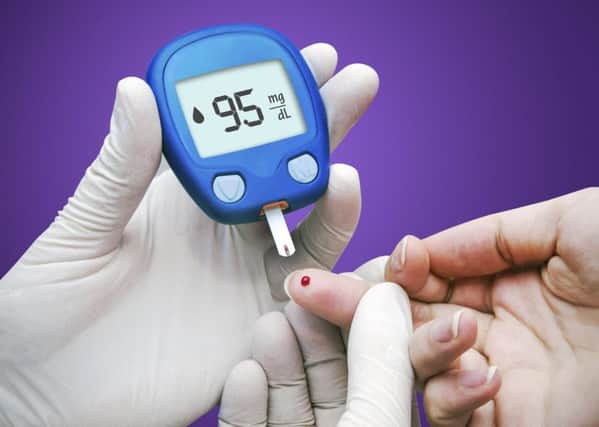Time to step up our efforts in the fight to beat diabetes


But while one answer is to invest more in education and improving screening, research into a cure is also vital to tackling this rising figure – and Scotland is uniquely placed to step up to the challenge.
Diabetes manifests itself as type 1 or type 2 and both are on the rise in Scotland. Without finding a means to tackle the condition many people will potentially experience complications such as blindness, kidney failure, stresses on the heart and amputation.
Advertisement
Hide AdAdvertisement
Hide AdWe know that diet and exercise can help to arrest many cases of type 2 diabetes, but there is no known cause for type 1. Yet in many ways it is type 1 that can hold the key to finding the cure to both.
Type 1 is a chronic autoimmune condition. Those with type 1 cannot produce the insulin that regulates their blood glucose levels because their immune system, for reasons not yet fully understood, attacks and destroys the insulin producing cells in the pancreas. Living with type 1 is an inescapable process of monitoring and regulating blood glucose levels.
Scotland has the third highest incidence of type 1 diabetes in the world and more than 29,000 people in Scotland live with the condition. Numbers are increasing at a rate of 4 to 5 per cent each year, particularly in children under five. A cure will give people with type 1 diabetes the ability to make their own insulin again.
Scotland’s best challenge to the condition is our academic powerhouse. With centres of excellence in the Universities of Edinburgh, Glasgow and Dundee, Scotland is an extremely important part of the UK’s medical research and academic training environment.
Thanks to the Scottish Care Information – Diabetes Collaboration (SCI-DC) initiative, Scotland has a register of people with type 1 which is the envy of those working in diabetes care and research south of the Border. Scotland also has the Diabetes Research Network Type 1 Diabetes Bioresource, which holds blood samples of more than 5,500 people with information on the patient’s diabetes history for future research.
Combined with areas such as stem cell research carried out at the MRC Centre for Regenerative Medicine, based at the University of Edinburgh, Scotland is the ideal place to conduct clinical and public health research.
Such strengths are already reflected in Juvenile Diabetes Research Foundation (JDRF) and Diabetes UK’s decisions to fund Scottish researchers. JDRF alone has committed nearly £4m to research that looks at the complications associated with type 1 diabetes, glucose deficiencies and cell replacement therapies.
What’s more, research here in Scotland directly feeds into a global JDRF resource that collates all data to accelerate paths to better interventions, treatments and ultimately a cure.
Advertisement
Hide AdAdvertisement
Hide AdDiabetes is a major threat to the health of Scots, yet we also have an undeniable level of expertise to help solve the problem.
By playing a greater part in finding the cure for type 1 diabetes, we would be collaborating with clinicians around the world, building our knowledge and theirs as leading experts in a field of medicine with huge significance both at home and internationally.
A cure for diabetes is within our reach; we just need to step up and declare our intent. As the head of JDRF’s development committee in Scotland, my aim is to see Scotland be part of an international success story.
We are calling on all candidates in the upcoming Scottish Parliament elections to back our vision for the future and provide the funding that can make it a reality.
The challenge is clear. We have the expertise. We have the data. We have the will. We just need the resource.
Peter Jones is chair of the JDRF Development Group in Scotland